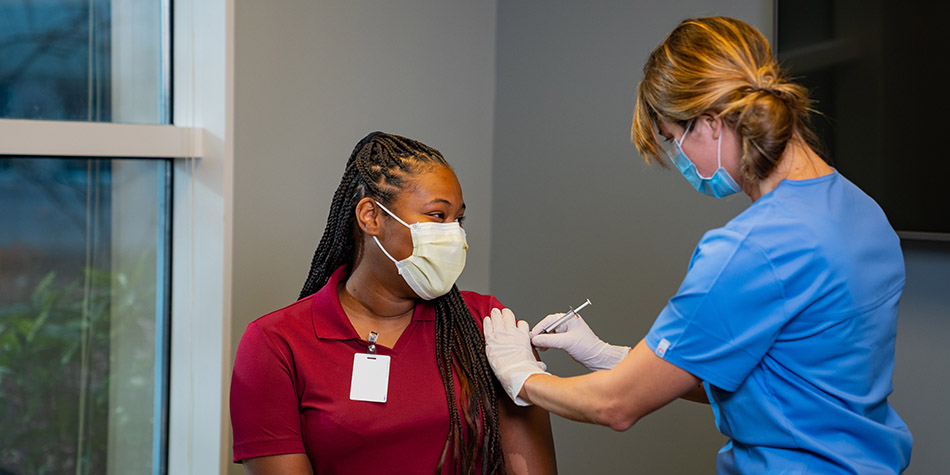
How do COVID-19 vaccines work to stop the virus?
COVID-19 vaccines deliver genetic instructions that train the immune system to fight off SARS-coV-2, the virus that causes COVID-19. The Food & Drug Administration has authorized three vaccines for emergency use so far. We asked Jake O'Shea, MD, FACEP, chief medical officer for HCA Healthcare Capital Division, to explain the technology behind these vaccines, which are proving to be highly effective.
How do COVID-19 vaccines differ from traditional vaccines?
Traditional vaccines deliver weakened or inactivated parts of a virus to a person's body. Once a person is vaccinated, their immune system will recognize these pieces of virus and create antibodies to neutralize them. If the person is exposed to the real virus in the future, their immune system will be able to respond right away to prevent or minimize illness.
COVID-19 vaccines don't deliver weakened or inactive parts of SARS-coV-2. Instead, they contain genetic instructions that help the body's own cells make harmless parts of viral proteins that teach the immune system how to fight off the virus.
How do they do that?
Dr. O'Shea: If you have ever seen a picture of SARS-coV-2, the virus that causes COVID-19, you know that its surface is covered with tiny “crown structures.” These structures are called spike proteins. The only place these spike proteins exist is on the surface of SARS-coV-2. The virus uses these spike proteins to latch onto cells in our body and make us sick.
The COVID-19 vaccines contain instructions that tell cells to create a harmless piece of the spike protein. As the cells start churning out these “imposter spike proteins”, the body's immune system recognizes the proteins as enemy intruders and creates antibodies to attack them. One of the great aspects of the human immune system is that it has tremendous memory. This process helps the immune system create the “memory” it needs to prepare for an invasion of real spike proteins associated with SARS-coV-2. If the SARS-coV-2 virus enters the body, the immune system will use that memory to recognize and attack the virus.
How are the three COVID-19 vaccines similar to each other, and how are they different?
All three of the vaccines tell the immune system to create imposter spike proteins. But they deliver the instructions in a different way.
The Moderna and Pfizer BioNTech vaccines use a new-to-vaccines method called mRNA technology. mRNA, also known as messenger RNA, is a naturally occurring molecule in the body that tells our cells which proteins to make. The Moderna and Pfizer vaccines contain man-made mRNA molecules that give the cells genetic instructions to make the imposter spike proteins.
The one-shot vaccine from Johnson & Johnson is a viral vector vaccine. It uses a weakened form of a common cold virus, known as an adenovirus, to deliver genetic instructions to the cell. Then, similar to what happens with mRNA technology, the cell makes the imposter spike protein.
Is mRNA technology new?
Dr. O'Shea: Scientists have been studying and working with mRNA technology for decades. They have considered using it for flu, Zika virus, rabies, and cytomegalovirus (CMV) vaccines. Cancer researchers believe mRNA technology may be helpful in the fight against cancer as well.
Do these vaccines damage your cells or affect your genes?
Dr. O'Shea: No. The instructions that the vaccines deliver to the cells aren't incorporated into your cells or genes. After cells make the imposter spike protein, they break down the instructions that came from the vaccine and get rid of them.
What's a better way to build immunity — by getting the vaccine or catching COVID-19?
Dr. O'Shea: Both cause your body to make antibodies against SARS-coV-2. But getting COVID-19 carries greater risks. As we all know, some people — even young, otherwise healthy people — can get very sick from this disease. Some are hospitalized and experience long-term effects. There is no way to know exactly how COVID-19 will affect you until you get it.
Some people are reluctant to get a COVID-19 vaccine because of possible side effects from the shot. Compared to the potential risks associated with COVID-19, these side effects — which can include fatigue, achiness, and fever — are much less worrisome. They don't last very long and are not life-threatening for the vast majority of people.
To put it in perspective, more than 500,000 people in the U.S. have died from COVID-19. But the CDC has reported that no one in the U.S. has died as a result of receiving one of the vaccines.
How effective are the vaccines?
Dr. O'Shea: All three of the approved vaccines are effective. Based on clinical trials results, the Moderna and Pfizer/BioNTech vaccines were about 95% effective overall, and the Johnson & Johnson vaccine was about 66% effective overall at preventing any COVID-19 infection. Those results are all more effective than annual flu vaccines, which the CDC reports are typically 40-60% effective at preventing flu infection. More importantly, the data we have seen indicates that all three of the approved vaccines provide excellence protection from severe illness and death due to COVID-19.
The Centers for Disease Control and Prevention (CDC) is continuing to monitor the safety and effectiveness of COVID-19 vaccines, including those still in development. But for now, it is safe to say that vaccines offer a great deal of promise in our efforts to end the pandemic.
To learn more
Visit the CDC website
for additional resources and information about COVID-19 vaccines.